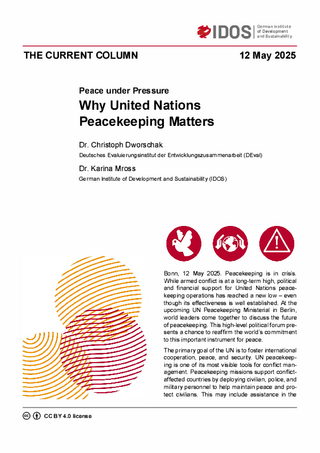Peace under Pressure
Why United Nations Peacekeeping Matters
Dworschak, Christoph / Karina MrossThe Current Column (2025)
Bonn: German Institute of Development and Sustainability (IDOS), The Current Column of 12 May 2025
Bonn, 12 May 2025. Peacekeeping is in crisis. While armed conflict is at a long-term high, political and financial support for United Nations peacekeeping operations has reached a new low – even though its effectiveness is well established. At the upcoming UN Peacekeeping Ministerial in Berlin, world leaders come together to discuss the future of peacekeeping. This high-level political forum presents a chance to reaffirm the world’s commitment to this important instrument for peace.
The primary goal of the UN is to foster international cooperation, peace, and security. UN peacekeeping is one of its most visible tools for conflict management. Peacekeeping missions support conflict-affected countries by deploying civilian, police, and military personnel to help maintain peace and protect civilians. This may include assistance in the disarmament and reintegration of former combatants, the training of police officers, or the dismantling of unauthorised checkpoints. All missions require both a UN Security Council mandate and host country consent.
The need for peacekeeping is high, but support is dwindling. The number of armed conflicts reached an all-time high in 2023, fuelling humanitarian emergencies and taking a devastating toll on human life. Yet, UN peacekeeping is being downsized year after year, with its budget having shrunk by more than a third over the last decade. Meanwhile, prominent cases such as Israel’s deliberate attacks on UN peacekeepers and the erosion of host country support demonstrate the legitimacy crisis of UN peacekeeping. These developments may come as no surprise in a time in which international cooperation and a shared sense of global responsibility increasingly give way to nationalist policies and populist rhetoric.
Granted, peacekeeping is no panacea. Case studies raise important criticisms, such as a lack of context sensitivity. In doing so, they highlight needs for reform and give evidence on challenges and weaknesses among prominent missions like in the DRC. Meanwhile, accusations continue to emerge of peacekeepers not having done enough to protect civilians. In sum, these issues may seem to warrant doubt about the effectiveness and efficiency of the instrument in general.
Despite its limitations, however, ample evidence shows that peacekeeping works. Multiple studies systematically establish that UN peacekeeping is effective in protecting civilians, preventing civil war recurrence, reducing the death toll, containing violence, and limiting refugee flows. Moreover, the prospect of UN peacekeeping facilitates peace settlement. Critics sometimes argue that these encouraging findings are only the result of missions going to “easy cases” to begin with. However, research shows that the opposite is the case, with peacekeepers being sent to the frontlines of the most severe conflicts. While it is easy to point at an attack on civilians that peacekeepers failed to prevent, it is much harder to know how many attacks did not take place thanks to their presence. Effective prevention is highly cost effective but rarely leaves a mark. That is why many studies investigate how conflicts would have evolved with or without peacekeepers, and consistently show that peacekeeping missions yield a clear net benefit. Therefore, while UN peacekeeping missions come with important limitations that need to be addressed, they represent an effective tool for protecting civilians and building peace.
To strengthen UN peacekeeping for tomorrow's challenges, several aspects are critical. First, mission mandates must be matched by adequate resources to achieve their goals, avoiding a "capability-expectations gap" that weakens operational effectiveness and jeopardises mission success. Second, UN peacekeeping requires “robust” mandates for the protection of civilians. To foster sustained peace, these should work in tandem with broader peacebuilding efforts, as was effectively done in, for example, Liberia. Third, and related, the composition of peacekeeping troops matters for their effectiveness and needs systematic planning, rather than being a byproduct of logistical considerations. Fourth, anticipatory action is a crucial element of both mission success and civilian protection. To this end, UN peacekeeping needs to modernise its early warning capability. Last but not least, over the past years, UN peacekeeping has made important progress towards more gender-responsive training and mission design. In the current political climate, conscious effort is needed to maintain this momentum.
As the Ministerial proceeds, member states must recommit to actively support the institution of UN peacekeeping operations. Peacekeepers require robust and clearly defined mandates, sufficient resources, and political backing. In an increasingly fragmented world, we cannot afford to abandon one of the most reliable instruments for building and preserving peace.
Christoph Dworschak is Evaluator at the German Institute for Development Evaluation (DEval)* and senior methods advisor of the Beyond Compliance Consortium at the University of York. His research focuses on peace and conflict, with an emphasis on mass mobilisation, civil-military relations, and UN peacekeeping. *The views expressed are the author's own and do not necessarily represent the views of DEval.
Karina Mross is Senior Researcher at IDOS. In her research she investigates what helps to foster peace and social cohesion in conflict-affected contexts, focusing on international peacebuilding efforts and political institutions.


